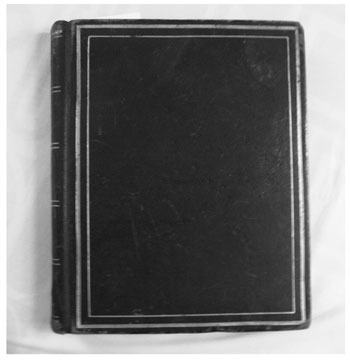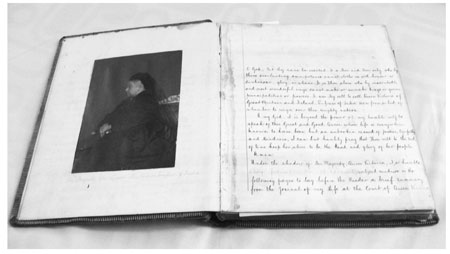Victoria & Abdul (2 page)
Authors: Shrabani Basu

It happened sooner than I expected. I was in Bangalore for the launch of
Victoria & Abdul
when I received a call from the British Council that Javed Mahmood, great-grandson of Abdul Karim, wanted to see me. It transpired that his mother, Begum Qamar Jehan, 85, was the daughter of Abdul Rashid. Frail and blind, Begum Qamar Jehan nevertheless had vivid recollections of her days in Karim Lodge in Agra, which she described as the ‘happiest’ in her life. The family showed me pictures of Abdul Karim and Abdul Rashid and told me there was a diary in Karachi. Abdul Rashid had nine children and their families lived in India and Pakistan. Begum Qamar Jehan was the last survivor of his children. Two months later I was on a plane from London to Karachi to meet the rest of the family and see the diaries of Abdul Karim. The story had come full circle.
In Karachi, I was handed the diary – a neat brown journal with gold edges – that I recognised instantly as the stationary used in Windsor. Inside was the record of Karim’s ten years in London between the Golden and the Diamond Jubilees. The pages were also filled with pictures and magazine cuttings. It was a scrapbook and journal. The diary had been smuggled out by the family along with other artefacts when they had left India in 1947 in the dark days of the partition riots.
‘There was a rumour that Karim Lodge would be attacked,’ said Zafar Sartaj, who was nine when the family left India. As Hindus and Muslims rioted in the streets of Agra, the women and
children were sent in the dead of night to Bhopal in central India, where the nawab was a friend. From Bhopal they took the train to Bombay (the women hiding their jewellery in their saris) and finally an overcrowded ship to Karachi, joining the thousands of refugees leaving for Pakistan. Two trunks full of precious artefacts were sent on the goods train to Pakistan. The train was looted and the treasures never arrived. The diary, some pictures and artefacts including the tea set gifted by the Tsar of Russia and a statuette of Abdul Karim did make it, carried on the boat by the men of the family.
The English in the diary was too flawless to be Karim’s, so I suspect he dictated the words to someone. Perhaps they were written by his friend Rafiuddin Ahmed. The diaries make no mention of the unpleasantness he suffered in court, almost as if he wanted to cauterise those details. Sadly, there is nothing after 1897, so we have no account of his leaving England and the last days in Agra. In the diary he mentions that his wife was planning to publish her own journals. She would have written these in Urdu. There is no trace of this diary. The Munshi’s wife died on the boat to Karachi, an old woman who had lived in Royal palaces and seen European Royalty at close hand, but was now leaving her country as a refugee.
Karim began his journal with due modesty:
Under the shadow of Her Majesty, Queen Victoria, I a humble subject venture in the following pages to lay before the reader a brief summary from the journal of my life in the court of Queen Victoria from the Golden Jubilee of 1887 to the Diamond Jubilee of 1897. As I have been but a sojourner in a strange land and among a strange people I humbly trust all mistakes will be kindly overlooked by the reader who would extend indulgence to the writer of these pages.
He ended with the words: ‘I shall be well content if the perusal of this little work be attended with some interest or pleasure to the person into whose hands it may chance to fall.’
Over a hundred years after it was written and lost, it has been a privilege to update this edition with Karim’s diary.



RAMATIS
P
ERSONAE
The Royal Family
Queen Victoria – Queen of England and Empress of India
Prince Albert Edward, Prince of Wales, ‘Bertie’, later King Edward VII – son of Queen Victoria
Princess Alix, Princess of Wales, later Queen Alexandra – consort of Prince Edward
Princess Victoria, Vicky, Empress of Germany – eldest daughter of Queen Victoria
Princess Alice, Grand Duchess of Hesse – second daughter of Queen Victoria
Princess Helena of Schleswig Holstein – third daughter of Queen Victoria
Prince Arthur, Duke of Connaught – son of Queen Victoria
Princess Beatrice – youngest daughter of Queen Victoria
Prince Henry of Battenberg – husband of Princess Beatrice
Prince George, later King George V – grandson of Queen Victoria
Princess May of Teck, later Queen Mary – consort of Prince George
Prince Louis of Battenberg – husband of Queen Victoria’s granddaughter
Abdul Karim – Queen Victoria’s Munshi
Mohammed Buksh – Queen Victoria’s attendant
Dr Wuzeeruddin – Abdul Karim’s father
The Munshi’s wife
The Munshi’s mother-in-law
Hourmet Ali – Queen Victoria’s attendant and Abdul Karim’s brother-in-law
Ahmed Husain – Queen Victoria’s attendant
Sheikh Chidda – Queen Victoria’s attendant
Ghulam Mustapha – Queen Victoria’s attendant
Khuda Buksh – Queen Victoria’s attendant
Mirza Yusuf Baig – Queen Victoria’s attendant
Bhai Ram Singh – architect of Durbar Hall
Sir John Tyler – Superintendent of Agra Jail
Abdul Rashid – Abdul Karim’s nephew
Rafiuddin Ahmed – solicitor, journalist, friend of Abdul Karim
Duleep Singh – son of Maharajah Ranjit Singh deposed ruler of Punjab, Queen Victoria’s ward
Nripendra Narayan – Maharajah of Cooch Behar
Sunity Devi – Maharani of Cooch Behar
Hurwan Singh – Maharajah of Kapurthala
Sayaji Rao Gaekwad – Maharajah of Baroda
Chimnabai – Maharani of Baroda
Sir Henry Ponsonby – Private Secretary to Queen Victoria
Sir James Reid – Personal Physician to Queen Victoria
Frederick (Fritz) Ponsonby – Assistant Private Secretary to Queen Victoria
Arthur Bigge – Assistant Private Secretary to Queen Victoria, later Private Secretary to Queen Victoria
Alexander (Alick) Yorke – Groom in Waiting and Master of Ceremonies for Royal Theatricals
Marie Mallet – Maid of Honour
Lady Jane Churchill – Lady-in-Waiting
Harriet Phipps – Woman of the Bedchamber and Private Secretary to the Queen
Lady Edith Lytton – Lady-in-Waiting
Ethel Cadogan – Maid of Honour
Fleetwood Edwards – Keeper of the Privy Purse
Dighton Probyn – Private Secretary to the Prince of Wales
Edward Pelham Clinton – Master of the Household
Lord Dufferin | 1884–88 |
Lord Lansdowne | 1888–94 |
Lord Elgin | 1894–99 |
Lord Curzon | 1899–1905 |
Lord Minto | 1905–10 |
Lord Cross | 1886–92 |
Lord Kimberley | 1892–94 |
Lord Fowler | 1894–95 |
Lord Hamilton | 1895–1903 |
Lord Morley | 1905–10, 1910–14 |
Marquess of Salisbury | 1885–86, 1886–92, 1895–1902 |
William Gladstone | 1880–85, 86, 1892–94 |
Earl of Rosebery | 1894–95 |


Map of India showing the British India Territories and the Native States in the nineteenth century.

Map of Britain showing the Royal palaces and neighbouring cities during Queen Victoria’s reign.
